Note You are currently viewing a previous version of this narrative statement as published in previous iterations of the KEF (KEF1 and KEF2). View the latest version
Institutional Context
Summary
Canterbury Christ Church University is essential to the fabric and vitality of our local and regional economy and communities. Embedded throughout the region, we innovate to support education, health, public services, industry and communities in their place of need. We develop graduate talent for schools, healthcare and SMEs, and deliver research and innovation to support regional economic growth and prosperity.
For six decades we have been a major contributor to regional and national public services, a strong foundation for recent growth and diversification into medicine, engineering, creative and digital to address regional skills shortages while narrowing gender and social participation gaps. We are a trusted partner, a source of talent and innovation, and a stimulus for creative exchange of ideas.
Institutional context
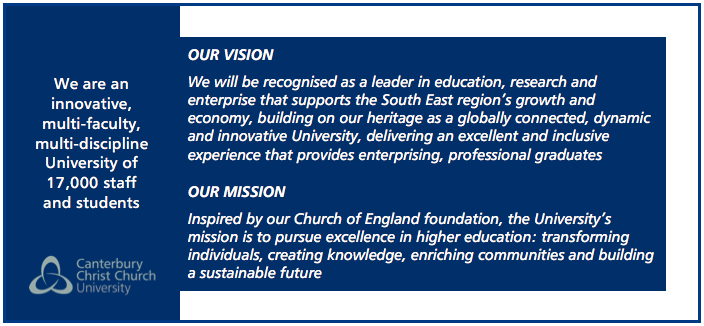
Driven by innovation and expansion to serve industry, economic, public service and community need, Canterbury Christ Church University (CCCU) is essential to the local and regional economy and influential in shaping its growth. We deliver deep regional impact and focused national and international influence. We have provided almost 14,000 graduates to the Kent and Medway economy in the last five years, of whom more than 90% originated from the region. However, we have also delivered a further 10,000 graduates to the national and international economy. Our Research Excellence Framework return will showcase our national and international influence, but for KEF we focus on our deep local and regional impact, particularly: (i) research and innovation partnerships, training and development with business, and the public and third sectors; (ii) skills, enterprise and entrepreneurship to drive local growth and regeneration and public and community engagement.
Our train and retain focus supports our local and regional engagement, and our plans for growth. We are embedded in the fabric of local and regional education, health, public services, industry and innovation, and this is at the heart of our approach. There is barely a school, hospital or clinical commissioning group in Kent and Medway that is not supported by regular contact and advice from CCCU staff, and that does not employ a CCCU graduate. We have industry hubs throughout the region, including our Industry Liaison Laboratory at Discovery Park in Sandwich, our Institute of Medical Sciences in Medway, and exciting new future education and innovation provision within Ebbsfleet Garden City’s Health and Education Innovation Quarter. Further hubs, supported by European Regional Development Funding, are planned for Canterbury, Folkestone and Maidstone.
Our embeddedness is unique and vital, both to support public services in their place of delivery, but also to drive innovation in a local and regional economy dominated by small and medium enterprises (SMEs), for whom access to services and support at a place and time that supports their need is a determining factor in their ability to engage. It also allows us to deliver trusted evidence, evaluation and research to inform local business and policy development. The success of our approach is reflected in year-on-year growth in our Higher Education - Business and Community Interaction survey returns.
Our strategy continues to be informed by local and regional skills and innovation needs, seeking to widen participation, diversity and sustainability in the workforce, and support regeneration. Research undertaken in 2014 identified skills and innovation shortages in relation to science, engineering, technology and medicine which underpinned the development of our flagship Engineering, Design, Growth and Enterprise (EDGE) Hub, ranging across science, technology, engineering, creative and digital, and supported by £28million of public and industry funding, as well as private donations. Similarly, our development of the Kent and Medway Medical School (jointly with University of Kent) has secured £20million in external funding and donations, and now provides the largest area of the country previously without a medical school with the means to train and retain a vital clinical workforce.
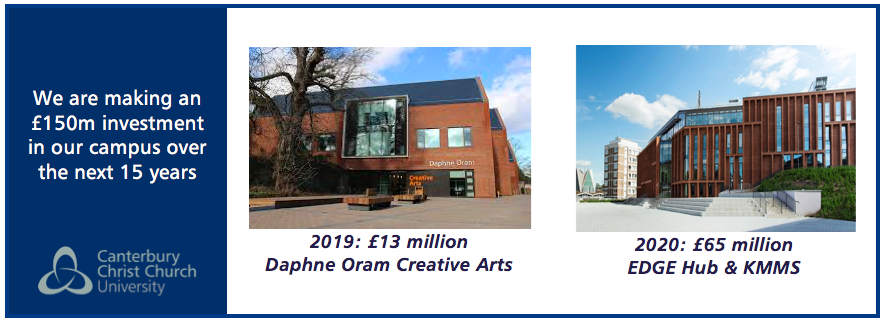
For further information, please send queries to abbie.kempe@canterbury.ac.uk
Local Growth and Regeneration
Summary of approach
Canterbury Christ Church University has grown and diversified over 60 years into a multi-faculty, multi-discipline university embedded in the fabric of education, public services, and industry across Kent and Medway. We are an essential and trusted partner to the local and regional economy, and influential in its growth.
We support public services in their place of delivery, and innovation in SMEs, for whom access to services and support at a place and time that supports their need is a determining factor in their ability to engage.
Through our industry hubs and services we are delivering activity supported by £48million in grants, contracts and donations, forming part of a £65million investment to create economic impact of £10m+ per annum.
Aspect 1: Strategy
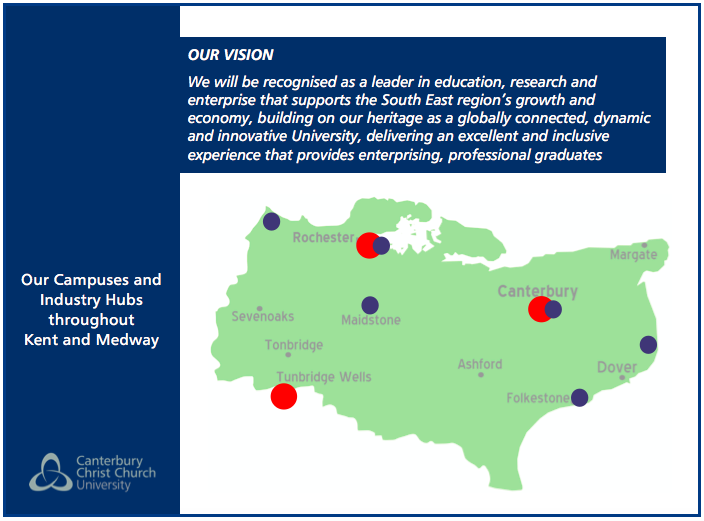
Since our inception as a teacher training college in 1962, Canterbury Christ Church University has grown and diversified into healthcare and medicine, creative and digital, science and technology and across business, the economy and policy. We are now a multi-faculty, multi-discipline university of 17,000 staff and students, continuing to expand and innovate to serve the needs of public services, industries and communities in the South East and, more specifically, Kent and Medway. We are an essential and trusted partner to the local and regional economy, and influential in its growth.
LOCAL CONTEXT: Our Kent and Medway focus is defined by history, local geography, and research into local need and impact. With a coast on three sides, Kent and Medway presents geographical barriers to social mobility and includes areas with some of the highest indices of social deprivation in the country, particularly in coastal communities. There is a higher skills shortage: only 35% of the population possess Level 4+ skills (national average = 40%). Among 18-24 years, unemployment has exceeded the national average since 2018. Finally, there are few large anchor employers outside public services, and economic activity is dominated by small and medium enterprises (SMEs), comprising over 99% of businesses. In fact, with a local economic impact of £596million, and an expanding network of industry hubs and campuses across West, North, Central and Eastern Kent, Canterbury Christ Church University is one of the largest employers and economic actors in Kent and Medway.
LOCAL IMPACT: Our contribution to local growth and regeneration has always been driven by the employment and economic activity of our graduates. We have analysed destination data, which shows we have provided almost 14,000 graduates to the Kent and Medway economy in the previous five years, and while many were in education and health professions, many others were employed in SMEs. Furthermore, 90% originated from Kent and Medway, highlighting the success of our train and retain strategy that raises aspiration through schools outreach, delivers an industry-informed curriculum, and provides a sustainable workforce for the local and regional economy.
STAKEHOLDER ENGAGEMENT: These insights underpin our Stakeholder Engagement Strategy and approach to Regional Impact, supported by investment in a Stakeholder CRM system, which continually refines and updates information on the needs and aspirations of individual businesses and stakeholders.
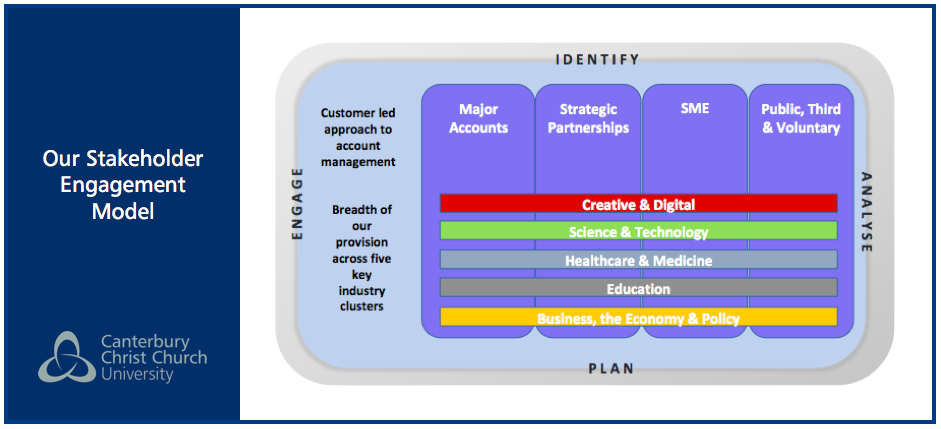
Each local authority and major business client is allocated a designated Senior Leader, and our Department of Enterprise, Employability and Research Development manages, promotes and enhances our relationships and offer across five industry clusters, derived from our our analysis of need and impact.
STRATEGY: Our strategic aims to support local growth and regeneration include a commitment in our Strategic Framework to ‘develop strategic research and enterprise partnerships with industry and the public and third sectors, embedded in the local and regional economy…’, and in our Strategic Plan for Research & Enterprise to being ‘…connected to the local and regional economy, taking, translating and applying our knowledge resources and insights to people and places’.
EDGE HUB: Following research on the shape of the local and regional economy and workforce in 2014, we developed a major new strategic initiative to support local growth and regeneration: our Engineering Design, Growth and Enterprise (EDGE) Hub, ranging across science, technology, engineering, creative and digital. EDGE Hub will be headquartered in a new £65million facility on our Canterbury campus, but it is the co-ordinating concept for current and planned industry hubs throughout Kent and Medway to deliver an estimated regional economic impact of £11million per annum. These distributed hubs, which supplement campuses in Canterbury, Medway and Tunbridge Wells, include our Life Sciences Liaison Laboratory at Discovery Park in Sandwich, our Institute of Medical Sciences in Medway, and exciting new future education and innovation provision within Ebbsfleet Garden City’s Health and Education Innovation Quarter. The distributed EDGE Hub approach has also been applied to our Kent & Medway Medical School (jointly developed with University of Kent), which responds to local need to provide the largest area of the country previously without a medical school with the means to train and retain a vital clinical workforce.
Aspect 2: Activity
Our embeddedness in the fabric of education, public services, industry and innovation across Kent and Medway is at the heart of our approach. With a local and regional economy dominated by SMEs, and the public sector as the largest employer, this embeddedness is unique and vital, both to support public services in their place of delivery, but also to innovate with SMEs, for whom access to services and support at a place and time that supports their need is a determining factor in their ability to engage.
INDUSTRY HUBS AND SERVICES: Co-ordinating through our EDGE Hub, our strategy has created industry hubs and a service offer distributed throughout Kent and Medway that supports local growth and regeneration in situ. We use our research, data and local intelligence to identify need, and work with key local and regional partners, including Kent and Medway Economic Partnership, Kent Invicta Chamber of Commerce, Locate in Kent and local authorities to deliver.
DISCOVERY PARK: A trailblazer for the EDGE Hub concept has been our Life Sciences Industry Liason Laboratory, located at the heart of Europe’s largest Science Park in Sandwich. Established in 2015, the Laboratory has partnered with onsite companies such as Venomtech, HTG Molecular Diagnostics and Anton Paar on targeted cancer treatments and diagnostics, and Topigs, Genea and JSR Genetics on animal in vitro fertilisation to improve animal welfare and reduce the food industry’s carbon footprint. The laboratory provides onsite SMEs with direct access to graduate talent, and secured more than £300,000 in contracts and support before it opened its doors. It is an excellent illustration of how access to innovation and advice embedded in industry locations at a time and place that supports SME need supports growth and innovation, and it has been adopted as the model for our EDGE Hub concept.
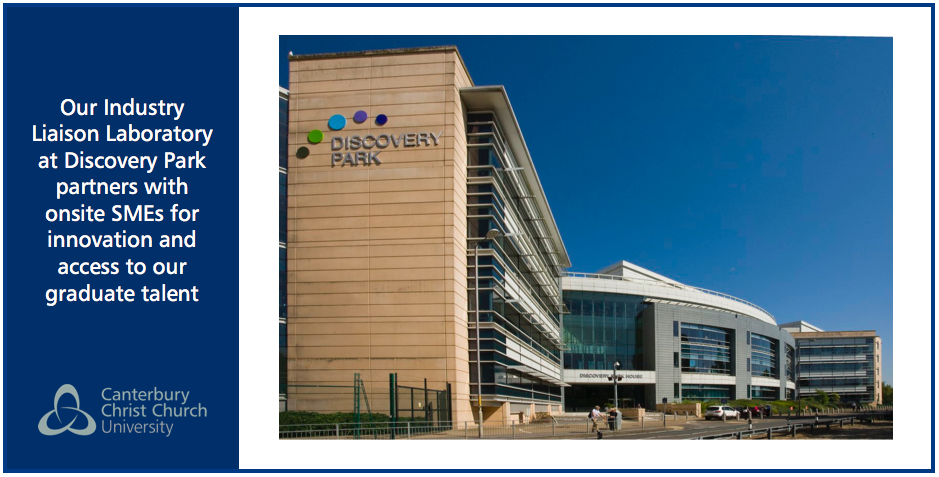
EBBSFLEET: In North-West Kent, we have worked with Ebbsfleet Development Corporation, its partner district authorities, local clinical commissioning groups, NHS Trusts, and Kent County Council to support the growth of the largest planned UK ‘new town’ for 100 years, and the regeneration of a 1,000acre+ brownfield site. We were initially commissioned as Academic Partner to the NHS-funded Ebbsfleet Healthy New Town initiative, and the largest partner in the 15 New Town project network, with our work supporting the development of healthy environments and design for the Ebbsfleet community. We then, with the Development Corporation and other partners, developed an Education Vision for the Ebbsfleet area across early-years, primary, secondary, post-compulsory and life-long education, focusing particularly on the intersection of education with health and wellbeing. Finally, we are core partners in Ebbsfleet’s Health and Education Innovation Quarter (HEiQ), for which we will deliver an Industry Innovation Centre, which will support the lifelong skills needs of the local population, the innovation aspirations of local and inwardly investing SMEs, and form another location in our EDGE Hub network.
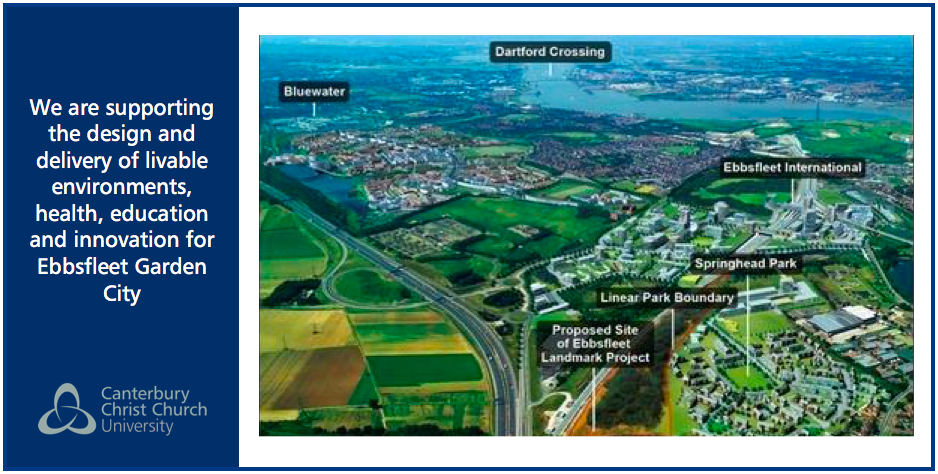
FUTURE HUBS: Further hubs will be supported by two recent ERDF-funded successes. We are partners in Maidstone Borough Council’s £5.8m project to develop the Kent Medical Campus Innovation Centre. And, with London South Bank University, we are partners in R&D4SMEs a recently awarded £6.1million project to leverage digital technology to provide research and innovation support to screen industry SMEs across London and the South East, with the Kent and Medway element comprising new hubs in Canterbury, Folkestone and Maidstone, and local industry partners Maidstone Studios, Screen South and Creative Folkestone.
EXTENDING OUR REACH: Beyond our Industry Hubs, we work across Kent and Medway to engage and deliver to SMEs in their local areas. To extend our reach, we collaborate with key umbrella bodies such as the Kent Invicta Chamber of Commerce, Visit Kent, Locate in Kent, local authorities and, of course, the Kent and Medway Economic Partnership (KMEP), the federated region of the South East Local Economic Partnership, on which we are the HE representative. Our reach was further boosted in 2019 with £500,000 funding from the Office for Students for GradForce, a project that assists Kent and Medway SMEs to access and employ new graduates, and provides support and advice to those SMEs during graduates’ first year of employment. We also deliver trusted evidence, evaluation and research to support SMEs, with recent commissions including the development of creative industry SMEs in East Kent, the impact of Brexit on local SMEs, an audit of Kent & Medway tourist accommodation, and opportunities for collaboration between tourist and arts and culture SMEs.
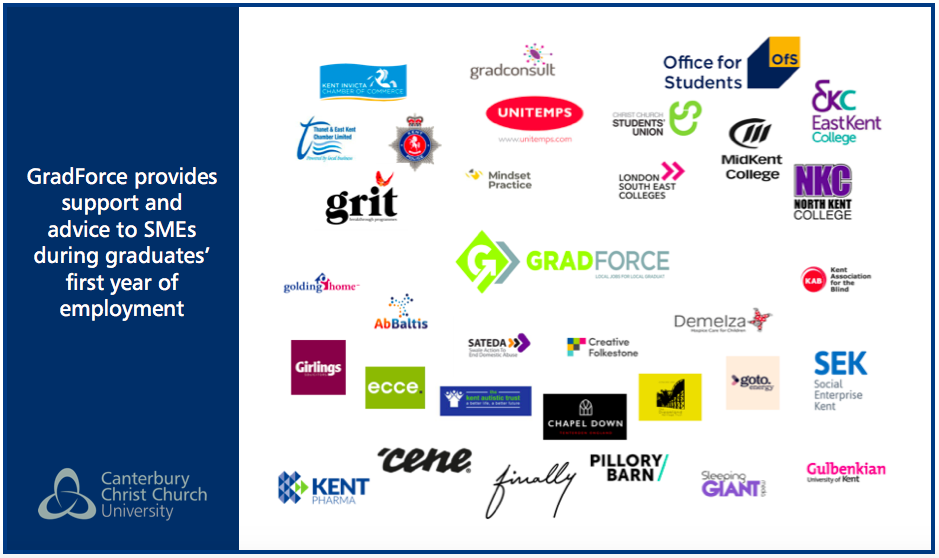
Aspect 3: Results
The outcomes of our recent activity to support local growth and regeneration are at four stages of completion, and the evidence and indicators we describe reflect this.
FUNDING IMPACT: In total, the broad range of activities set out as part of the EDGE Hub Network have received funding of £28million, comprising Local Growth Fund (£6.12million, January 2018), HEFCE Catalyst Fund (£7million, September 2017), ERDF (£5.8million, March 2019; £6.1million, September 2020), OfS (£0.5million, May 2019), GarfieldWeston (£0.5million, June 2019), and research, innovation and consultancy totalling £2million. At its November 2017 Board meeting (http://kmep.org.uk/meetings) KMEP noted the important regional impact of an expected 389 jobs and 1,250 new graduates. This impact has now been enhanced by the expections of the ERDF funding that Kent Medical Campus Innovation Centre will support 185 new start-ups and create 159 new jobs, and that R&D4SMEs will provide 90 SMEs with innovation advice, of which 66 will link with R&D and 42 will launch new products.
PHYSICAL REGENERATION: In 2015, our Industry Liaison Laboratory at Discovery Park was the stimulus for the re-opening of the iconic ‘Building 500’ which had lay derelict and disused since Pfizer vacated this part of the Discovery Park site in 2011, and has been identified as a core part of the regeneration of the wider 220 acre site, which passed the landmark of 3,000 new jobs in 2017 (https://discovery-park.co.uk/our-timeline/). At Ebbsfleet our research and innovation to support the livability of the revitalised environment through planning, provision and design for sustainable healthy living and lifelong learning is helping to deliver the regeneration of former industrial land into a modern Garden City, clustered around Ebbsfleet international station, that will comprise 15,000 new homes and host 30,000 jobs by 2035 (https://www.canterbury.ac.uk/business/strategic-projects.aspx). In Canterbury, Folkestone and Dover, the first phase of R&D4SMEs will renovate and re-commission 550 square metres of commercial property to provide access to new digital production technologies to SMEs that would not otherwise have had such access. Finally, at our Canterbury campus, we have re-vitalised the disused five acre site of the former Canterbury Prison, clearing derelict buildings and investing £65million in a new 20,000 square metre state-of-the-art science and technology facility that will house both our EDGE Hub and the Kent and Medway Medical School.
NETWORKS: Our research into the shape of the local and regional economy and workforce, and our analysis of our graduate destination data has helped us to expand the reach of our networks, and consequently the number of SMEs we are able to support. We have used this data and analysis to build our Stakeholder CRM system and refine our understanding of the needs of individual SMEs, and have recorded almost 1,000 partnerships and interactions with demonstrable outcomes in less than a year of operation. Our network is continually expanding, supported by a new suite of B2B webpages launched in January 2020, and GradForce progressing towards its target to engage 250 SMEs by the end of its OfS funding.
OUTCOMES: Examples in the last year include: supporting one of our partners at Discovery Park, Venomtech, to revise its product range to deliver new venom assays to allow full testing of recently discovered venoms that inhibit binding of SARSCov2 within the body; designing improvements to the built environment at Ebbsfleet to promote cycling, walking and participatory ‘greenscaping’; working with 3DCrowdUK to distribute specifications for 3D printing of PPE visors during the COVID-19 pandemic, increasing production from 50 to 6,000 visors per week.
For further information, please send queries to Abbie.kempe@canterbury.ac.uk
Public & Community Engagement
Summary of approach
Canterbury Christ Church University is a broad based multi-faculty, multi-discipline university of over 17,000 staff and students, with a significant history and continuing public service ethos that underpins our public and community engagement.
We are committed to stimulating and enabling a creative exchange of ideas that: (i) supports intellectual, social and cultural prosperity; (ii) addresses the challenges facing the sectors and communities we serve, the issues with which our students are engaged, and the areas in which they wish to develop careers; (iii) enhances and enriches people’s lives.
During 2019-2020 we engaged over half a million people in on-campus and sponsored events, contributed almost 13,000 community volunteering hours, and delivered education activities that engaged 800,000+ children and young people.
Aspect 1: Strategy

Now a broad based multi-faculty, multi-discipline university of over 17,000 staff and students, we have a significant history (and continued provision) in the public services including education, health professions and policing, which underpins a public service ethos that drives our wider public and community engagement.
CONTEXT: We aspire to make an impact on the communities and sectors we serve, and in which our students wish to develop careers: 14,000 of our graduates gained employment locally in Kent and Medway in the last five years; many entered the public services, whilst others secured careers in creative and digital, science and technology and other areas of business, the economy and policy.
STRATEGY: Drawing on our context and derived from commitments in our Strategic Framework, Graduate Attributes Statement and Strategic Plan for Research & Enterprise, our strategic objectives for public and community engagement are to stimulate and enable a creative exchange of ideas that: (i) supports intellectual, social and cultural prosperity; (ii) addresses the challenges facing the sectors and communities we serve, the issues with which our students are engaged, and the areas in which they wish to develop careers; (iii) enhances and enriches people’s lives.
GOVERNANCE: Responsibilities sit with our Enterprise and Engagement Board, chaired by the Pro Vice-Chancellor (Research & Enterprise), which reports through our Research and Enterprise Integrity Committee to our Academic Board, and onward to our Governing Body.
IMPLEMENTATION: We allocate resources horizontally to central teams, and vertically to subject areas, who each identify relevant public and community groups and their needs, setting central and local priorities accordingly to achieve our strategic objectives. These teams variously fall under the oversight of the Vice-Chancellor, Pro Vice-Chancellor (Research & Enterprise), Director of Marketing and Communications, and Faculty Deans
ACCESS: Our campuses are open access, and our Augustine House library, St Gregory’s Centre for Music and Daphne Oram Building for Creative Arts welcome the public for events, activities and access. Our £150million Estate Master Plan will create a public ‘Pilgrims Way’ from St Martins Church, the world’s oldest continuously established Anglican church, through the heart of our campus, co-located on a UNESCO World Heritage Site alongside St Augustine’s Abbey, to Canterbury Cathedral, with whom we have a longstanding memorandum of understanding regarding culture and heritage, learning and engagement, worship and mutual hospitality, including hosting our graduations.
Aspect 2: Support
CENTRAL SUPPORT: Our Department of Enterprise, Employability and Research Development includes dedicated staff resource for community activation, to support volunteering, and for third sector engagement. Partnership with Christ Church Students’ Union includes a joint volunteering and community engagement database, student Volunteering Awards, and collaborative campaigns such as voter engagement and climate change: our Climate Emergency Declaration was co-signed by the Vice Chancellor and Students’ Union President. Corporate Communications and the Vice-Chancellor’s Office support flagship public lectures and events, with other pan-university teams supporting Sport and Active Health, Arts and Culture and Sustainable Futures.
SUBJECT AREA SUPPORT: Devolved support follows priorities set out in Faculty Research and Enterprise Portfolio Plans, in which community outcomes and activities (including those involving students) are a cross-cutting theme. Support comprises the enabling resource of central teams, and devolved funding to support the staff time and activity. There are clear synergies with research impact: many activities in Aspect 3 feature in REF impact case studies. Staff are rewarded for public and community engagement though explicit recognition in promotion and progression.
TRAINING AND DISSEMINATION: Staff development in, for example, Media Engagement Training and Social Media Training, supports staff to promote public access and engagement with the knowledge, debates and resources arising from their work. Our Open Access Policy includes a presumption of publication and public availability via our Institutional Repository. Access is further enabled by a strategy of developing linked short-form digestable content for our Expert Comment blogs, which feature on our website front page, and are promoted and signposted from our central, subject-based and individual staff social media channels, such as Instagram, Facebook, LinkedIn and Twitter.
Aspect 3: Activity
Illustrative examples of our activity to stimulate and enable a creative exchange of ideas to support our strategic objectives include:
(i) Supporting Intellectual, Social and Cultural Prosperity
SPONSORSHIP: Kent County Cricket womens team (longest standing sponsorship in County Cricket), Canterbury Festival (Partner and Principal sponsor from 2009), 2019 Turner Prize at Margate’s Turner Contemporary (plus successive audience development and social return on investment projects since 2017), Folkestone Book Festival (education partner from 2019), Canterbury Pride (from 2019).
ACTION RESEARCH: Two Heritage Lottery Fund projects (£400,000) have supported local engagement with Folkestone’s heritage. Since 2014, with £900,000 from Oak Foundation, we have developed, delivered and evaluated Silver Song Clubs to support physical and mental health among older people.
VOLUNTEERING: We work with and support local charities, including homelessness (e.g., Porchlight, Catching Lives), food poverty (e.g. Fareshare) and domestic violence (e.g. Rising Sun, SATEDA), and develop our own interventions: for example, our health students designed and delivered a telephone befriending service to combat loneliness during COVID-19.
(Ii) Addressing Challenges in the Sectors and Communities we Serve:
DEBATE AND CAMPAIGNS: Since 2004 our Making Politics Matter campaign has promoted political engagement, most recently at the 2017 and 2019 general elections. Successive ESRC Festival of Social Science events focused on the global economy, Brexit, climate change and political activism. Our Time for Dementia (HEKSS, £120,000) and Suicide Safer Communities (NHS England, £650,000) initiatives raise awareness, but also provide education and CPD to support professional development.
OUTREACH AND SUPPORT: Major projects to support, inspire and raise aspirations of young people include: STEM Hub (£470,000, STEM Learning Ltd), Community Lab (in partnership with Pfizer) and Epistemic Insight (£1.2million, Templeton World Charity Foundation) to promote science engagement; Passing on Faith (£277,000, Douglas Trust) to support religious education; Thinking Differently About the Arts (£42,000, Royal Opera House and partners) to promote cultural education; UniConnect (£305,000), plus £750,000 institutional investment, for widening participation; Resources for teachers and parents to support home learning during the COVID-19 lockdown.
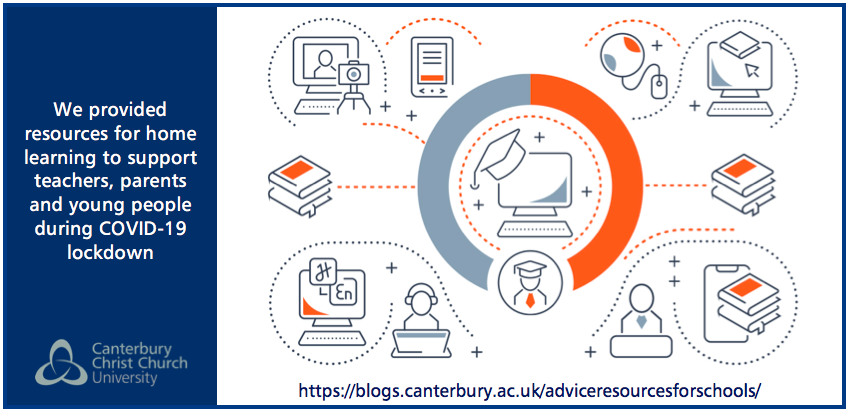
(iii) Enhancing and Enriching People’s Lives
SPORT & ACTIVE HEALTH: Community participation partnerships with Canterbury Rugby, Football and Hockey Clubs, Invicta Athletics, Kent Cricket, and a major joint facility with the 47acre Polo Farm Sports Club. Community Fit for Life classes for older adults, partnership with Our Parks to deliver outdoor activities, and open online classes (prompted by COVID-19).
ARTS & CULTURE: Collaborative delivery, including with Marlowe Theatre, Creative Folkestone, Heritage Lab, Kent Cultural Transformation Board and South East Creative Economy Network, welcomes the community into our flagship facilities, including our new £13million Daphne Oram Building for the Creative Arts and our St Gregory’s Centre for Music.
EVENTS: Our public lecture series has hosted the Speaker of the House of Commons, and the Leaders of the Liberal Democrats, UKIP and the Green Party, the fomer Governor of the Bank of England and Chief Medical Officer, the CEOs of Stonewall and Arts Council for England, and the former World Land Speed Record holder. Notable public event examples include: Anifest, an annual festival of animation, featuring Disney, Pixar, Dreamworks and Aardman Animations, and Kent History Weekends, alternatiing between Medieval History and Tudors and Stuarts, since 2016.
Aspect 4: Results and learning
Our HEBCI return shows 60,000+ attendees at campus events in the last three years. However, given our strategic approach to be embedded in the fabric of the communities we serve, by design our engagement mainly takes place in and amongst those communities. Funded initiatives have their own monitoring arrangements; internally resourced activities are monitored locally by delivery teams. Beyond quantitative monitoring, all local teams gather qualitative insights to evaluate depth of engagement, formally, informally or anecdotally. Insights, be they formal or informal, quantitative or qualitative, inform reflections and drive provision improvements based on local objectives and success indicators. This necessarily devolved approach to delivery, monitoring and evaluation allows us to evidence the following illustrative outcomes and impacts against our strategic objectives.
(I) Supporting Intellectual, Social and Cultural Prosperity
SPONSORSHIP: 2019/20 attendances: Canterbury Festival, 65,000+; Folkestone Book Festival, 5,000+; Canterbury Pride, 16,000+. Content promoting women’s sport on Kent County Cricket website: 300,000+ hits. These sponsorships are all targeted at increasing access, understanding and aspiration among their respective communities
ACTION RESEARCH: Folkestone HLF projects collectively engaged 16,000+ in local heritage and history. Silver Song Clubs extend across UK, Europe, Canada and New Zealand, and our research, featured in NICE Guidance, demonstrates improvements in Alzheimer’s, Parkinson's, Dementia, Stroke, and COPD.
VOLUNTEERING: Staff and students have contributed approaching 20,000 community volunteering hours since 2017.
(Ii) Addressing Challenges in the Sectors and Communities we Serve:
DEBATE & CAMPAIGNS: Making Politics Matter hustings for 2017 and 2019 general elections were each oversubscribed (300+ and 500+ respectively), with live streaming needed to other rooms. In 2017 voter turnout in Canterbury increased by 14% from 2015, and at 73% was 4% above national average, rising to 8% above national average in 2019.
OUTREACH AND SUPPORT: Cumulatively, STEM Hub, Community Lab, Epistemic Insight, Passing on Faith, Thinking Differently About the Arts, UniConnect and ESRC Festivals of Social Science have engaged 800,000+ young people, 9,000+ teachers, and 5,000+ schools during 2019/20. Our resources to support home learning during COVID-19 lockdown were accessed 5,000+ times.
(iii) Enhancing and Enriching People’s Lives
SPORT & ACTIVE HEALTH: Cumulative hits for online classes during first two months of COVID-19 lockdown were 100,000+, with 3,000+ likes and 1,500+ comments, including participants in Australia and USA.
ARTS & CULTURE: Total attendances, boosted by a seven-week Virtual Orchestra event with London Philharmonia, almost doubled to 29,309 in 2019.
EVENTS: The cumulative audience for our flagship Public Lecture series approaches 3,500 since 2016/17 (14 events). Cumulative attendances at Anifest and Kent History Weekends since 2016 have been 1,765 and 6,250 respectively, with attendees from all four home nations, mainland Europe and the USA.
We have also undertaken extensive commissioned work (circa £300,000) evaluating community engagement activities for sports and arts delivered by others, including the Youth Sport Trust, Sport England, ukactive, parkrun, Mencap, Military Wives and Choir of the Year.
Aspect 5: Acting on results
Despite the necessarily local and devolved nature of much of our monitoring and evaluation, the aggregate composite data presented in Aspect 4 suggests that, in volume terms at least, we are meeting our strategic objectives for public and community engagement.
CIVIC UNIVERSITY AGREEMENT: The aggregate volume of our activity across our public and community engagement objectives complements the activity we describe and evidence in the companion narrative on our Local Growth and Regeneration, particularly our embeddedness in the fabric of education, public services, industry and innovation across Kent and Medway. Consequently, we are confident that we already fulfil and exceed the four principles that underpin Civic University Agreements, and we are looking forward to developing a formal agreement.
CONTINUOUS IMPROVEMENT: Our ongoing analysis of our graduate destination data (see Aspect 1) suggests we are delivering activities on the issues and in the areas with which students are engaged, and in which they wish to develop careers. NSS and Graduate Outcomes data shows scores above the national average for students’ feeling prepared for, and using knowledge in, their careers. We are also confident that the local monitoring and evaluation described in Aspect 4 drives improvement in specific activities, as well as that our commissioned evaluations drive improvement in the activities of others. As noted in Aspect 3, where we have formal monitoring and evaluation reports, our presumption is that these will be quickly published on our Institutional Repository, and in cases where feedback is not collated in formal reports, we undertake as far as possible to share and discuss it with our stakeholder groups and audiences.
FORMAL STRATEGIC MONITORING: We do not currently have a formal monitoring framework for integrated assessment of the overall impact our public and community engagement. The aggregate composite data in Aspect 4, and our local monitoring and evaluation, gives us confidence that we are achieving our objectives, but a strategic integrated framework would provide us with useful management information for action and to support corporate investment decisions. Consequently, we will be engaging with NCCPE to explore signing the Manifesto for Public Engagement and adopting their EDGE strategic monitoring tool.
For further information, please send queries to abbie.kempe@canterbury.ac.uk